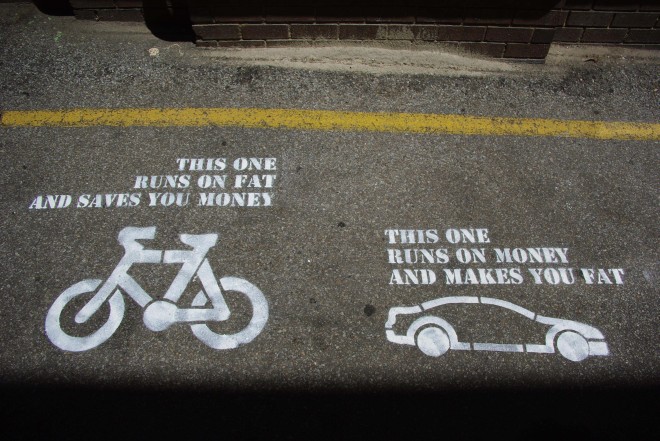
Rewarding cycling’s €119 billion contribution: ECF policy talk
 Credit: Carlton Reid
Credit: Carlton Reid
Car use costs us money. Cycling saves us money. European policy needs to reflect this, says ECF's Environment and Health Policy Officer, Benoit Blondel.
You may wonder what a transport externality is. Put simply, they are the costs (negative externalities) or benefits (positive externalities) which aren’t reflected in your transport bill.
Have I already lost you?
Well, it works like this. When you pay to fill up your petrol tank, the pump price doesn’t take into account external costs you create such as air pollution or noise pollution. Or conversely, when you ride your bicycle, the benefits you bring to society (less strain on the health care system etc.) are often left unrewarded.
Want More?
You can read more about ECF's work on EU Health Policy here.
This may be set to change. There are big policy debates going on within the European institutions on how to move forward with the “internalisation of external costs for all modes of transport”.
So what does this actually mean?
It means making sure the costs of transport reflect the true total cost, including the social cost. From an economic perspective, to reach the ideal equilibrium means transport prices must reflect the total costs of transport, (i.e. the private costs plus the social costs). Otherwise, those that pollute get off for free. And for the same reason, transport prices must reflect the total benefits of modes of transport. If you cycle, and you bring about positive change to society, you should be financially rewarded. It is not so much about fairness, but more about efficiency!
Rewarding Cycling
One of the real worries for ECF is that the European Commission does not consider the external health benefits of cycling. We’ve got numbers to back up our case.
"External costs of car use totals at least €240 billion annually... cycling is worth up to €119 billion in annual savings"
A combination of all main externalities of passenger cars costs society between 0.05 and 0.06 euro per passenger-kilometre. This means that external costs of car use totals at least €240 billion annually in the EU-27. The flipside of the coin; cycling. With health benefits estimated between 0.30 euro and 1,19 euro per kilometre, cycling is worth up to €119 billion in annual savings. Double cycling and you would generate €238 billion in health benefits, almost as much as the total external costs of car use.
Therefore, if we want a fair and efficient transport regime, then we must make sure those that pollute pay their fair share, and also reward those (yes, I mean you cyclists) who bring so much economic value to society.
How achieve internalisation of external health benefits of cycling? Tax incentives, rebates and bike to work schemes could be a good start (you can see some national examples here). But the biggest first step is recognising the economic value of cycling by increasing levels of physical activity.
The Commission itself says that the goal of ‘internalising transport externalities’ is 'to encourage transport users to switch over time to cleaner vehicles or transport modes'. If they don’t think about positive externalities, and rewarding active modes of transport, then they’ll have no hope.
 About the Author
About the Author
Benoit Blondel is the Health and Environment Policy Officer for ECF. He’s the author of ECF’s famous CO2 Study and has worked extensively with the United Nations, Brussels based NGOs in the health sector as well as Belgian cycling advocacy groups.
- Log in to post comments
Contact the author
Recent news!
Upcoming events
Contact Us
Avenue des Arts, 7-8
Postal address: Rue de la Charité, 22
1210 Brussels, Belgium









